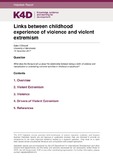| dc.contributor.author | O'Driscoll, Dylan | |
| dc.coverage.spatial | Kenya, Nigeria, Somalia, Sudan, Cameroon, Niger, Croatia, UK, | en |
| dc.coverage.spatial | Kenya | en |
| dc.coverage.spatial | Nigeria | en |
| dc.coverage.spatial | Somalia | en |
| dc.coverage.spatial | Sudan | en |
| dc.coverage.spatial | Cameroon | en |
| dc.coverage.spatial | Niger | en |
| dc.coverage.spatial | Croatia | en |
| dc.coverage.spatial | United Kingdom | en |
| dc.date.accessioned | 2018-12-17T15:25:17Z | |
| dc.date.available | 2018-12-17T15:25:17Z | |
| dc.date.issued | 2017-12-15 | |
| dc.identifier.citation | O’Driscoll, D. (2017). Links between childhood experience of violence and violent extremism. K4D Helpdesk Report. Brighton, UK: Institute of Development Studies | en |
| dc.identifier.uri | https://opendocs.ids.ac.uk/opendocs/handle/20.500.12413/14182 | |
| dc.description.abstract | This rapid review synthesises findings on the link between childhood experience of violence and violent extremism from rigorous academic, practitioner, and policy references. Despite opening up the query to multiple disciplines including psychology, political science and criminology, this review identified a limited number of studies focusing directly on the topic. The 2015 RUSI report on the drivers of violent extremism confirms this point, making no direct links between childhood experience of violence and violent extremism (Allan et al., 2015). However, those studies that have focused on the topic found a high level of experience of childhood violence among adults involved in violent extremism (Ellis et al., 2015; Simi et al., 2016; UNDP, 2017). Nonetheless, early traumatic experiences do not determine who will engage in violent extremism; rather they culminate in greater risk of involvement. As violent extremism is classified as having ideological motivations, traditional criminologist perspectives examining factors from childhood are largely ignored and there are limited studies utilising a life-course criminology framework to understand violent extremism. However, violent extremists are a heterogeneous population and their life histories often resemble members of conventional street gangs, thus life-course criminology frameworks could be useful, drawing on lessons learned from their use with street gangs (Simi et al., 2016). The review finds that the number of risk factors experienced during childhood, rather than any particular combination, are associated with childhood misconduct and potential later violence. The accumulation of negative experiences over time can lead to the person becoming increasingly susceptible to the pull of violent groups. There is often a pathway towards violence, beginning with accumulated childhood experiences, leading to adolescent misconduct, and finally adult use of violence. Links have also been found with childhood unhappiness and the journey towards extremism. Traumatic experiences during childhood can lead to an increased need for identity, which can be fulfilled by extremist causes. Higher exposure to trauma leads to a greater likelihood of developing Post Traumatic Stress Disorder (PTSD), which is associated with increased anger and hostility and greater urge for revenge versus reconciliation and thus increasing the likelihood of supporting violent extremism. Finally, higher exposure to trauma, as well as weaker social bonds, makes an individual more likely to engage in violent extremism. | en |
| dc.language.iso | en | en |
| dc.publisher | IDS | en |
| dc.relation.ispartofseries | K4D Helpdesk Report;248 | |
| dc.rights.uri | https://www.nationalarchives.gov.uk/doc/open-government-licence/version/3/ | en |
| dc.subject | Children and Youth | en |
| dc.subject | Gender | en |
| dc.subject | Health | en |
| dc.subject | Participation | en |
| dc.subject | Poverty | en |
| dc.subject | Security and Conflict | en |
| dc.title | Links Between Childhood Experience of Violence and Violent Extremism | en |
| dc.type | Other | en |
| dc.rights.holder | © DFID - Crown copyright 2018. | en |
| dcterms.dateAccepted | 2017-12-15 | |
| rioxxterms.funder | Department for International Development, UK Government | en |
| rioxxterms.identifier.project | K4D | en |
| rioxxterms.version | VoR | en |
| rioxxterms.funder.project | 238a9fa4-fe4a-4380-996b-995f33607ba0 | en |

